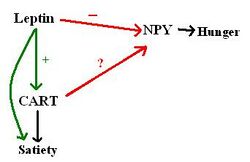Cocaine- and Amphetamine- Regulated Transcript: Difference between revisions
imported>Gareth Leng (New page: '''Cocaine- and Amphetamine- Regulated Transcript''' (CART) is a neuropeptide produced in specific neurons in the hypothalamus - including in the arcuate nucleus. It plays a ro...) |
imported>Gareth Leng No edit summary |
||
| Line 1: | Line 1: | ||
{{subpages}} | |||
'''Cocaine- and Amphetamine- Regulated Transcript''' (CART) is a [[neuropeptide]] produced in specific neurons in the [[hypothalamus]] - including in the [[arcuate nucleus]]. It plays a role in satiety, in association with leptin and [[neuropeptin Y]]; the former enhances satiety whereas the latter stimulates hunger. CART production has been shown to decrease in obese animals with dysfunctional leptin signalling, for example in the ''ob/ob'' mouse (which cannot produce leptin) and the ''fa/fa'' rat (which is resistant to leptin). The same animal models have increased expression of NPY in the hypothalamus, indicating that leptin inhibits the neuropeptide Y-mediated hunger signalling; this role seems to be partially facilitated by CART, as CART administration to the brain inhibits feeding in rats. In summary, CART appears to stimulate satiety, and is released in the hypothalamus in response to leptin. It also inhibits feelings of hunger, perhaps by an interaction with neuropeptide Y. Pharmaceutically exploiting its actions could be a potential method of tackling obesity. <ref>Kristensen P ''et al.'' (1998) Hypothalamic CART is a new anorectic peptide regulated by leptin. ''Nature'' 393:72-6</ref> | '''Cocaine- and Amphetamine- Regulated Transcript''' (CART) is a [[neuropeptide]] produced in specific neurons in the [[hypothalamus]] - including in the [[arcuate nucleus]]. It plays a role in satiety, in association with leptin and [[neuropeptin Y]]; the former enhances satiety whereas the latter stimulates hunger. CART production has been shown to decrease in obese animals with dysfunctional leptin signalling, for example in the ''ob/ob'' mouse (which cannot produce leptin) and the ''fa/fa'' rat (which is resistant to leptin). The same animal models have increased expression of NPY in the hypothalamus, indicating that leptin inhibits the neuropeptide Y-mediated hunger signalling; this role seems to be partially facilitated by CART, as CART administration to the brain inhibits feeding in rats. In summary, CART appears to stimulate satiety, and is released in the hypothalamus in response to leptin. It also inhibits feelings of hunger, perhaps by an interaction with neuropeptide Y. Pharmaceutically exploiting its actions could be a potential method of tackling obesity. <ref>Kristensen P ''et al.'' (1998) Hypothalamic CART is a new anorectic peptide regulated by leptin. ''Nature'' 393:72-6</ref> | ||
{{Image|leptin.jpeg|right|250px|The interaction of Leptin, CART and NPY}} | {{Image|leptin.jpeg|right|250px|The interaction of Leptin, CART and NPY}} | ||
==References== | ==References== | ||
<references/> | <references/> | ||
Revision as of 06:31, 15 December 2010
Cocaine- and Amphetamine- Regulated Transcript (CART) is a neuropeptide produced in specific neurons in the hypothalamus - including in the arcuate nucleus. It plays a role in satiety, in association with leptin and neuropeptin Y; the former enhances satiety whereas the latter stimulates hunger. CART production has been shown to decrease in obese animals with dysfunctional leptin signalling, for example in the ob/ob mouse (which cannot produce leptin) and the fa/fa rat (which is resistant to leptin). The same animal models have increased expression of NPY in the hypothalamus, indicating that leptin inhibits the neuropeptide Y-mediated hunger signalling; this role seems to be partially facilitated by CART, as CART administration to the brain inhibits feeding in rats. In summary, CART appears to stimulate satiety, and is released in the hypothalamus in response to leptin. It also inhibits feelings of hunger, perhaps by an interaction with neuropeptide Y. Pharmaceutically exploiting its actions could be a potential method of tackling obesity. [1]
References
- ↑ Kristensen P et al. (1998) Hypothalamic CART is a new anorectic peptide regulated by leptin. Nature 393:72-6
